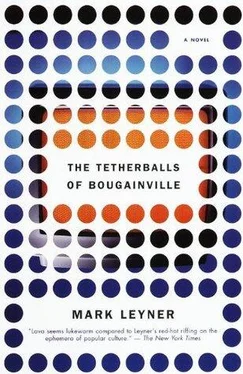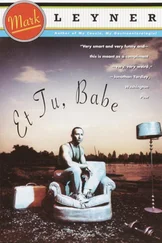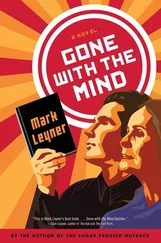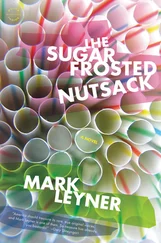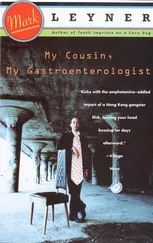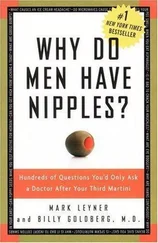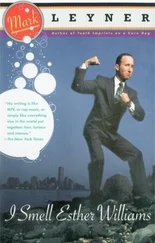“Well … this is like completely off the top of my head, but … After the drugs, my dad looks up and says ‘I feel shitty,’ right? Why don’t we take the Bernstein/Sondheim tune from West Side Story —‘I Feel Pretty’—overdub the word shitty —make ‘I Feel Shitty.’ And I’d slow it down to a dirge. Do a sort of Trent Reznor mix. ‘I feel shitty / oh so shitty / I feel shitty and witty and bright / and I pity / any girl who isn’t me tonight.’ ”
“That’s it!” hails the rabbi. “It’s lovely.”
Dad closes the catalog. “I can live with that.”
“It’s excellent, man,” says the executioner, giving me five.
“And I’d add a wheeze rhythm track,” I say. “Get a slow, really labored wheeze. Do you have any, like, asthmatic or black-lung wheeze samples?”
“I’ll check,” the superintendent says, rising to his feet.
With a ripple of cracking knee joints, everyone stands.
C’est fini . Finally.
It’s bye-bye time.
My father embraces me. He rocks me gently from side to side. And then, enclasped, we begin to revolve in a counterclockwise rotation, a dirty dance of sorts.
The room is hushed. The stenographer cranes her neck to better apprehend our murmured farewell, made even less audible by the Doppler effect of our axial motion.
“I don’t know when I’m going to see you again.”
“I know that, Dad.”
“There’s no going back, now.”
“I know.”
“No more fairy tales, ace. No restoration of the status quo ante. You know what I’m saying? You have to be the man now.”
“I know that, Dad.”
“And you have to start wearing a shirt.”
“Awwwwwww, Dad,” I whine. And then, testily, under my breath: “I wear a shirt when you lose the false eyelashes and titty-torture clamps, you punk-ass dusthead.”
Our faces slip in and out of crepuscular shadow as we slowly spin.
“It’s going to be tough on your mother. And you have to take care of that woman now. I’m an NJSDE releasee, and I can’t do it. You understand? In a few minutes I’m going to call and tell her that I may never see her again. And she’ll probably be wearing her black Thierry Mugler suit. And from that moment on she might sit home like Miss Havisham in that black Thierry Mugler suit — and she might wear that same fucking suit every single day for the rest of her life. And you have to be prepared to deal with that.”
I’m beginning to feel light-headed and slightly nauseated from the continuous counterclockwise gyre.
“Look at me, boy.”
“What’s the matter?”
“I have something I need to ask you,” he says gravely. “And I want you to take your time and think it over seriously before you give me your answer.”
“I will, Dad.”
We stop moving.
“Son … what’s the maxim that more eloquently than any other articulates a Leyner’s self-image, his worldview, his pride and ambition as a man, as a pagan moralist and as an American — the call to arms, the cri de coeur , the phrase-that-pays that can inspire and galvanize him for the rest of his life? I need to hear you say it, son.”
I peer fervently into my fathers eyes and squeeze him hard, as hard as I’ve ever squeezed another human being. And I recite those words, those stirring, unforgettable words, in defense of which — in the ensuing months — so many brave Bougainvillean boys will lose their minds:
“Any asshole with a Master of Social Work degree can put on a turban and start issuing fatwas about whom you can and whom you can’t mail meat to,” I intone, “but it takes real balls to turn a brunette without a cranium into a blonde.”
The room bursts into applause and I can see several people daubing tears from their eyes.
There’s now — as if conveyed via the sort of subliminal, instantaneously communicated signal that causes an entire herd on the savanna to suddenly change direction — an implicit sense of adjournment, and everyone gathers his or her personal effects and begins to filter out of the warden’s office.
“You’re going to the library from here to work on that screenplay, right?” my father asks.
“Yeah …” I answer, anticipating the inevitable corollary.
“So … you want to share a cab?”
I stare down at the floor, shifting my weight uneasily from foot to foot.
“I can’t, Dad … no way.”
I cringe, awaiting his response. And when none is forthcoming, I look back up.
He’s gone!
I scan the room and he’s nowhere to be seen.
“Hey, where’d my dad go?”
“He left,” says the superintendent, who’s just returned from his studio in the tear-gas control console booth. “I just passed him in the hall.”
That’s it. He’s gone, I say to myself, shaking my head. My father has now begun the grim, tormented, and macabre life of an NJSDE releasee, a life that may very well come to a violent and agonizing end within the next five minutes, within the next hour, or in a month, or a year, or — who knows? — flourish without untoward incident for another fifty years and then the blast of shrapnel or the Colombian necktie.
“Oh, by the way, I searched the patch files,” says the superintendent, “and we have a bronchitis wheeze sample.”
“Bronchitis … that sounds cool,” I say. “Just make sure the tempo is right — very, very slow, larghissimo, funereal. Like ‘I feel shitty / wheeze … wheeze / oh so shitty / wheeze … wheeze …’ ”
“Gotcha,” he says, extending his hand. “Mark, take it easy and good luck on the screenplay.”
“Thank you very much.”
We shake and he exits.
Ditto the operations officer.
“All the luck in the world on that screenplay.”
“Thanks, I appreciate it.”
The doctor.
“I’m keeping my fingers crossed for you on that Vincent and Lenore DiGiacomo / Oshimitsu Polymers America thing.”
“Thanks so much.”
And the executioner: “How much was that—$200,000 a year? Madonna! Whack that script out of the ballpark, chief.”
“I’m gonna try. Thanks a lot. And thanks for everything today.”
And then the rabbi.
He gestures elaborately at the mythical multiplex marquee in the sky. “Eventually, Even Mighty Mouse Is Vivisected by the Dour Bitch in a White Lab Coat,” he says, flashing a pair of avid thumbs-up.
“Thank you. Vaya con Dios , Rabbi.”
Now only the warden, the warden’s male secretary, the stenographer, and I remain in the office.
“Absolutely no calls and shut the door on your way out, please,” says the warden.
For a second I assume she’s talking to me.
“Absolutely no calls,” parrots the secretary, winking at me as he closes the door behind him.
When I turn and look back at the warden, she’s perched atop her desk, smirking cryptically, one eyebrow arched high, little diamond chips like crushed ice gleaming across the straps of her stilettos. And she’s got my two little notes in her hand: “You wanna get high?” and “Be my sweaty bosomy lover?” And she’s waving them in the air like a pair of theater tickets. Like front-row orchestra, opening night, Aeschylus’ Prometheus Bound at the Greater Dionysia in Athens in friggin’ 468 A.D. I mean, like a pair of real hot ducats.
Gulp.
Boing.
Three quick procedural items before we move on to substantive issues — namely, my impending drug- and alcohol-addled liaison with the warden. (What symmetry, right — the exile of my father and my initiation into manhood!)
First, to paraphrase Oxford zoologist Richard Dawkins, during the minute that it takes you to read this sentence, “thousands of animals are being eaten alive, many others are running for their lives, whimpering with fear, others are being slowly devoured from within by rasping parasites … It must be so. In a universe of electrons and selfish genes, blind physical forces and genetic replication, some people are going to get hurt, other people are going to get lucky, and you won’t find any rhyme or reason in it, nor any justice.” Now if you take another minute and reread that sentence, even more animals will be eaten alive and devoured by parasites. In fact, it’s almost as if reading that particular sentence actually causes the animals to be eaten alive and devoured by parasites. Is this possible? Well, yes, according to CERN physicist John Stewart Bell’s theorem of nonlocal interaction. Anyway, my point is — doesn’t it all make what we’re doing right now seem pretty ludicrous? I mean, there’s all that predation and whimpering and devouring going on out there, and you and I are just sitting here, writing and reading. It’s not the writing per se that bothers me, it’s the venue, the sedentarinous, the insularity. If only there were a more public, a more athletic, more agonistic way of doing it. What do you think I’d rather be doing right now: sitting in this book-lined atelier, stroking my chin, lost in this solitary reverie or striding into a domed stadium with a bag full of laptops, wearing a shirt emblazoned with logos — Apple, Microsoft Word, Xerox, Roget’s Thesaurus, Chivas Regal, Marlboro, Zoloft — and going head-to-head against the world’s top-ranked professional prose stylists, as 75,000 raucous, beer-swilling fans cheer our sentences as they instantly appear on the huge Diamond Vision screens?
Читать дальше
